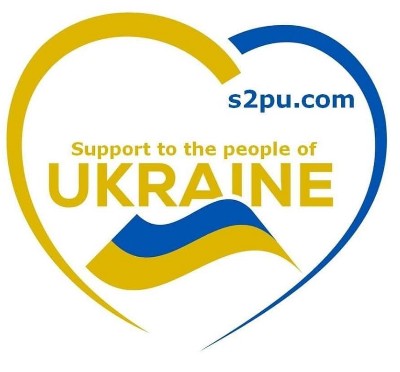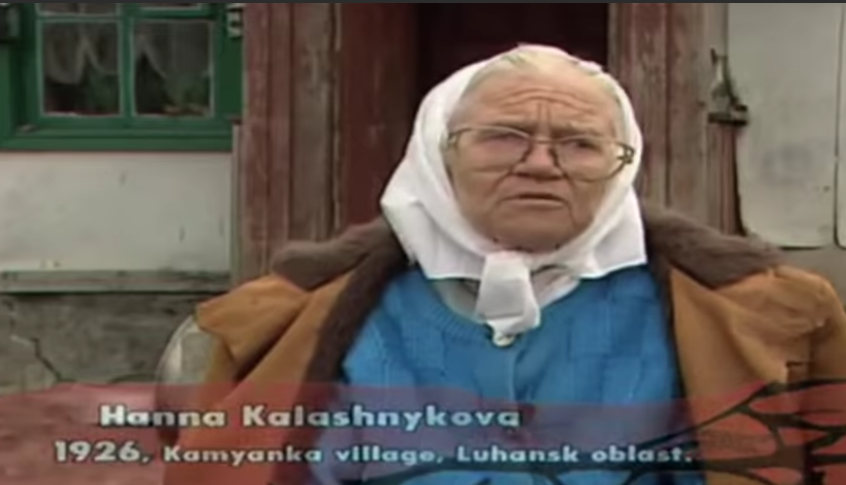The Holodomor was a very long time ago. Many question why so much time and energy is devoted to this issue. However, when we meet with survivors, when we hear them speak of their experiences, although we can never fully understand, it helps bring us closer to that period in history that had such an impact on what defines Ukrainians as a nation, and who they are today. The contribution of survivors to understanding the Holodomor is invaluable.
-
“Those who cannot remember the past are condemned to repeat it.”
George Santayana
-
“Please return the grain that you have confiscated from me. If you don’t return it I’ll die. I’m 78 years old and I’m incapable of searching for food by myself.”
(From a petition to the authorities by I.A. Rylov)
-
“I saw the ravages of the famine of 1932-1933 in the Ukraine: hordes of families in rags begging at the railway stations, the women lifting up to the compartment window their starving brats, which, with drumstick limbs, big cadaverous heads and puffed bellies, looked like embryos out of alcohol bottles …”
(as remembered by Arthur Kaestler, a famous British novelist, journalist, and critic. Koestler spent about three months in the Ukrainian city of Kharkiv during the Famine. He wrote about his experiences in “The God That Failed”, a 1949 book which collects together six essays with the testimonies of a number of famous ex-Communists, who were writers and journalists.)
-
Our father used to read the Bible to us, but whenever he came to the passage mentioning ‘bloodless war’ he could not explain to us what that term meant. When in 1933 he was dying from hunger he called us to his deathbed and said “This, children, is what is called bloodless war…”
(as remembered by Hanna Doroshenko)
-
“What I saw that morning … was inexpressibly horrible. On a battlefield men die quickly, they fight back … Here I saw people dying in solitude by slow degrees, dying hideously, without the excuse of sacrifice for a cause. They had been trapped and left to starve, each in his own home, by a political decision made in a far-off capital around conference and banquet tables. There was not even the consolation of inevitability to relieve the horror.”
(as remembered by Victor Kravchenko, a Soviet defector who wrote up his experiences of life in the Soviet Union and as a Soviet official, especially in his 1946 book “I Chose Freedom”. “I Chose Freedom” containing extensive revelations on collectivization, Soviet prison camps and the use of slave labor came at a time of growing tension between the Warsaw Pact nations and the West. His death from bullet wounds in his apartment remains unclarified, though it was officially ruled a suicide. His son Andrew continues to believe he was the victim of a KGB execution.)
-
“From 1931 to 1934 we had great harvests. The weather conditions were great. However, all the grain was taken from us. People searched the fields for mice burrows hoping to find measly amounts of grain stored by mice…”
(as remembered by Mykola Karlosh)
-
“I still get nauseous when I remember the burial hole that all the dead livestock was thrown into. I still remember people screaming by that hole. Driven to madness by hunger people were ripping the meat of the dead animals. The stronger ones were getting bigger pieces. People ate dogs, cats, just about anything to survive.”
(as remembered by Vasil Boroznyak)
-
“People were dying all over our village. The dogs ate the ones that were not buried. If people could catch the dogs they were eaten. In the neighboring village people ate bodies that they dug up.”
(as remembered by Motrya Mostova)
-
“I’m asking for your permission to advance me any amount of grain. I’m completely sick. I don’t have any food. I’ve started to swell up and I can hardly move my feet. Please don’t refuse me or it will be too late.”
(From a petition to the authorities by P. Lube)
-
“In the spring when acacia trees started blooming everyone began eating their flowers. I remember that our neighbor who didn’t have her own acacia tree climbed on ours and I went to tell my mother that she was eating our flowers. My mother only smiled sadly.”
(as remembered by Vasil Demchenko)
-
“Of our neighbors I remember all the Solveiki family died, all of the Kapshuks, all the Rahachenkos too – and the Yeremo family – three of them, still alive, were thrown into the mass grave…”
(as remembered by Ekaterina Marchenko)
-
“Where did all bread disappear, I do not really know, maybe they have taken it all abroad. The authorities have confiscated it, removed from the villages, loaded grain into the railway coaches and took it away someplace. They have searched the houses, taken away everything to the smallest thing. All the vegetable gardens, all the cellars were raked out and everything was taken away.
Wealthy peasants were exiled into Siberia even before Holodomor during the “collectivization”. Communists came, collected everything. Children were crying beaten for that with the boots. It is terrifying to recall what happened. It was so dreadful that every day became engraved in my memory. People were lying everywhere as dead flies. The stench was awful. Many of our neighbors and acquaintances from our street died.
I have no idea how I managed to survive and stay alive. In 1933 we tried to survive the best we could. We collected grass, goose-foot, burdocks, rotten potatoes and made pancakes, soups from putrid beans or nettles.
Collected gley from the trees and ate it, ate sparrows, pigeons, cats, dead and live dogs. When there was still cattle, it was eaten first, then – the domestic animals. Some were eating their own children, I would have never been able to eat my child. One of our neighbours came home when her husband, suffering from severe starvation ate their own baby-daughter. This woman went crazy.
People were drinking a lot of water to fill stomachs, that is why the bellies and legs were swollen, the skin was swelling from the water as well. At that time the punishment for a stolen handful of grain was 5 years of prison. One was not allowed to go into the fields, the sparrows were pecking grain, though people were not allowed.”
(From the memories of Olexandra Rafalska, Zhytomir)
-
“A boy, 9 years old, said: “Mother said, ‘Save yourself, run to town.’ I turned back twice; I could not bear to leave my mother, but she begged and cried, and I finally went for good.”
(Recollected by an observer simply known as Dr. M.M.)
-
“At that time I lived in the village of Yaressky of the Poltava region. More than a half of the village population perished as a result of the famine. It was terrifying to walk through the village: swollen people moaning and dying. The bodies of the dead were buried together, because there was no one to dig the graves.
There were no dogs and no cats. People died at work; it was of no concern whether your body was swollen, whether you could work, whether you have eaten, whether you could – you had to go and work. Otherwise – you are the enemy of the people.
Many people never lived to see the crops of 1933 and those crops were considerable. A more severe famine, other sufferings were awaiting ahead. Rye was starting to become ripe. Those who were still able made their way to the fields. This road, however, was covered with dead bodies, some could not reach the fields, some ate grain and died right away. The patrol was hunting them down, collecting everything, trampled down the collected spikelets, beat the people, came into their homes, seized everything. What they could not take – they burned.”
(From the memories of Galina Gubenko, Poltava region)
“The famine began. People were eating cats, dogs in the Ros’ river all the frogs were caught out. Children were gathering insects in the fields and died swollen. Stronger peasants were forced to collect the dead to the cemeteries; they were stocked on the carts like firewood, than dropped off into one big pit. The dead were all around: on the roads, near the river, by the fences. I used to have 5 brothers. Altogether 792 souls have died in our village during the famine, in the war years – 135 souls”
(As remembered by Antonina Meleshchenko, village of Kosivka, region of Kyiv)
“I remember Holodomor very well, but have no wish to recall it. There were so many people dying then. They were lying out in the streets, in the fields, floating in the flux. My uncle lived in Derevka – he died of hunger and my aunt went crazy – she ate her own child. At the time one couldn’t hear the dogs barking – they were all eaten up.”
(From the memories of Galina Smyrna, village Uspenka of Dniepropetrovsk region)
- This was the first instance of a peacetime genocide in history. It took the extraordinary form of an artificial famine deliberately created by the ruling powers. This savage combination of words for the designation of a crime — “an artificial, deliberately planned famine” — is still incredible to many people throughout the world, but indicates the uniqueness of the tragedy of 1933, which is unparalleled, for a time of peace, in the number of victims it claimed.
- Moscow employed famine as a political weapon against the Ukrainians for a second time in the years 1932-33, with this difference, that this time the famine was in its entirety artificially induced and organized. It was the result of a well worked-out plan which was to take in the entire Ukrainian SSR and the Kuban districts which had a Ukrainian population.
- Statement of Fedir M. Pihido, Engineer and Economist, Living at Neu-Ulm, Finningerstr, 3/0, and an Eyewitness to Stalin’s Famine in the Ukraine. Famine as an Instrument of Soviet Political Warfare' in Investigation of Communist Take-Over and Occupation of the Non-Russian Nations of the USSR: Eighth Interim Report of Hearings Before the Select Committee on Communist Aggression, House Of Representatives, Eighty-Third Congress, Second Session, Under Authority Of H. Res. 346 and H. Res. 438. Washington: Govt. Printing Office, 1954, 35
-
Research into the surviving documents that have been released since the collapse of the Soviet Union clearly has shown that the Soviet government used the Famine, which certainly hit the Soviet Union as a whole, and was particularly severe in other areas of peasant resistance, like the Volga and the Don, as a tool to break the Ukrainian peasantry’s opposition to collectivization in particular, and also to eliminate the leadership of the Ukrainian Communist Party, which it believed to be too nationalistic and too sympathetic to the plight of the peasantry.
- Professor Andrea Graziosi, University of Naples, The Ukrainian Weekly, Jan. 23, 2011


Comments powered by CComment